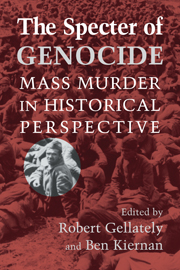Book contents
- Frontmatter
- Contents
- List of Contributors
- Acknowledgments
- INTRODUCTION
- PART I GENOCIDE AND MODERNITY
- PART II INDIGENOUS PEOPLES AND COLONIAL ISSUES
- PART III THE ERA OF THE TWO WORLD WARS
- 9 Under Cover of War
- 10 The Mechanism of a Mass Crime
- 11 The Third Reich, the Holocaust, and Visions of Serial Genocide
- 12 Reflections on Modern Japanese History in the Context of the Concept of Genocide
- PART IV GENOCIDE AND MASS MURDER SINCE 1945
- CONCLUSIONS
- Appendix: Convention on the Prevention and Punishment of the Crime of Genocide
- Index
12 - Reflections on Modern Japanese History in the Context of the Concept of Genocide
Published online by Cambridge University Press: 05 June 2012
- Frontmatter
- Contents
- List of Contributors
- Acknowledgments
- INTRODUCTION
- PART I GENOCIDE AND MODERNITY
- PART II INDIGENOUS PEOPLES AND COLONIAL ISSUES
- PART III THE ERA OF THE TWO WORLD WARS
- 9 Under Cover of War
- 10 The Mechanism of a Mass Crime
- 11 The Third Reich, the Holocaust, and Visions of Serial Genocide
- 12 Reflections on Modern Japanese History in the Context of the Concept of Genocide
- PART IV GENOCIDE AND MASS MURDER SINCE 1945
- CONCLUSIONS
- Appendix: Convention on the Prevention and Punishment of the Crime of Genocide
- Index
Summary
The twentieth century was marked by nothing so much as the intensity of state-sponsored violence and terror. Historians struggle to come to terms with this by making generalizations, weighing and measuring, setting events to a scale. Genocide, understood in broad terms as the attempt to wipe out whole peoples, has been allocated the polar position among such crimes, and among genocides, the Holocaust, understood as the attempt to exterminate the whole of the Jewish and Romany peoples (among an even broader range of categories), the place of absolute and unqualified evil. A prominent thread in the literature is that which insists that the only true case of genocide is the Nazi, because only the Nazis tried to achieve the annihilation of an entire people. However, it is reasonably clear now that in the evolving construction of the crime of genocide, the “classic” case of the Holocaust has been slowly extended to include at least three major examples: the “Aghet” massacre of Armenians by the Turkish empire between 1914 and 1923; the Khmer Rouge mass murder of Vietnamese, Cham Muslims, and other minorities and finally of urban Khmer between 1975 and 1979 in Cambodia; and the massacre of the Tutsi people in Rwanda in the 1990s. In that same vein, the Report of the Preparatory Commission for the International Criminal Court, in drawing up in July 2000 a systematic set of criteria by which acts of genocide might be identified, was also furthering the process of converting genocide from a unique evil to a particular, but possibly widespread, kind of state crime.
- Type
- Chapter
- Information
- The Specter of GenocideMass Murder in Historical Perspective, pp. 265 - 286Publisher: Cambridge University PressPrint publication year: 2003
- 2
- Cited by



